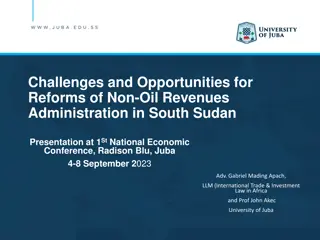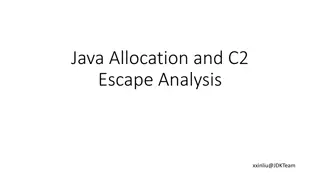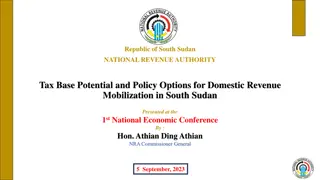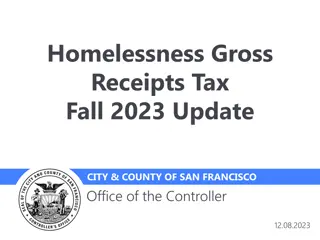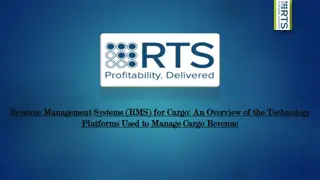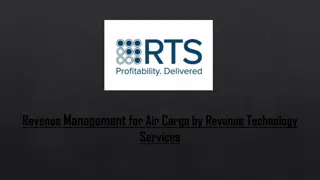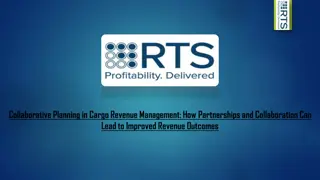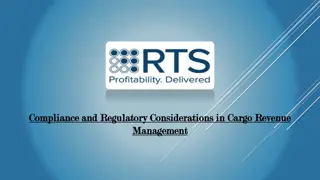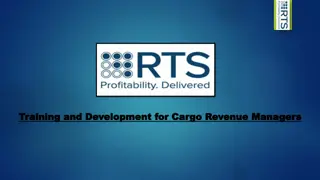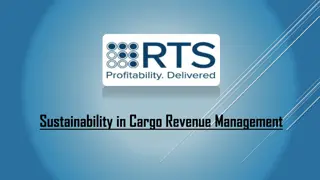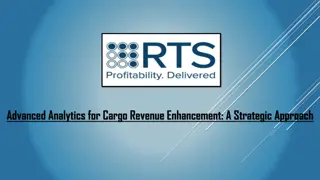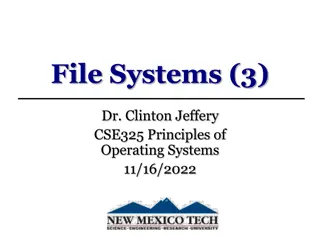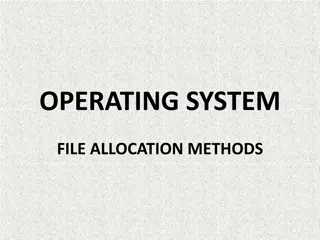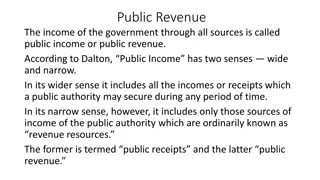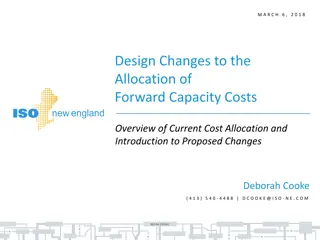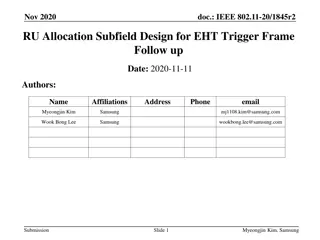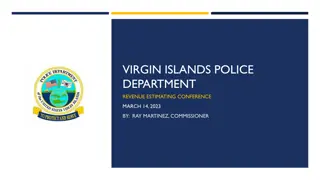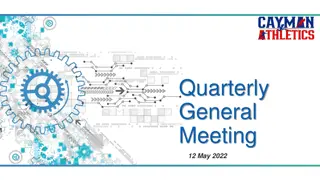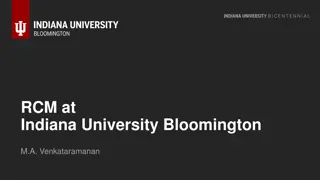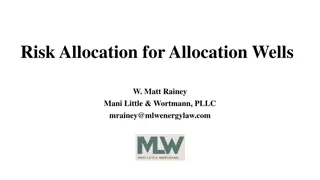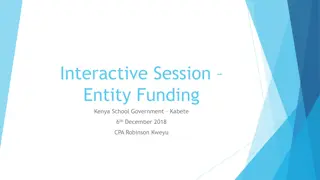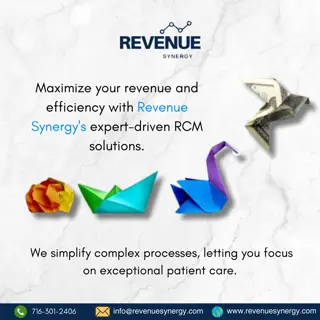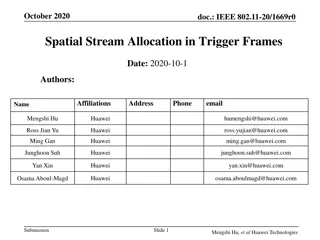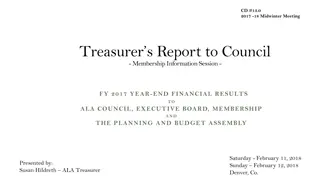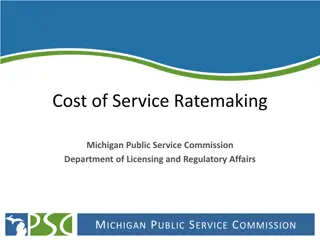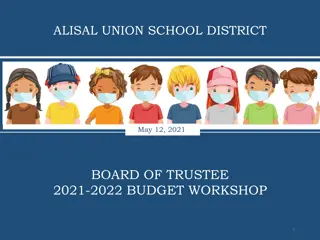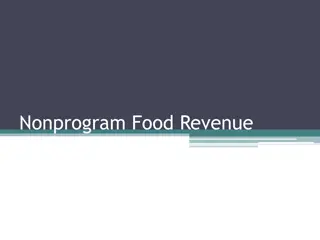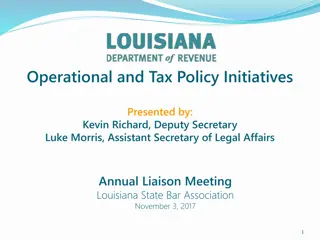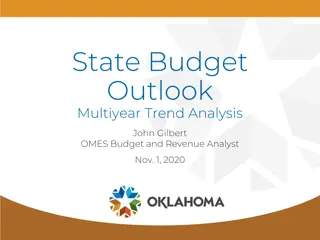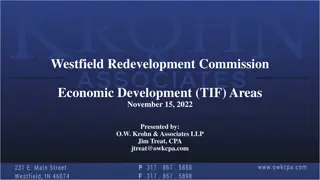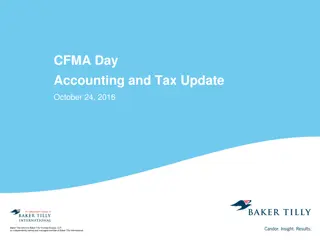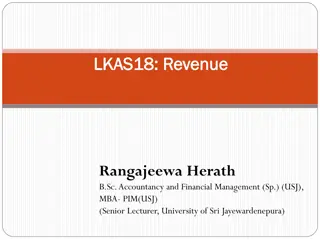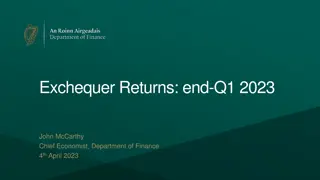Challenges and Opportunities for Reforms of Non-Oil Revenues Administration in South Sudan
The presentation highlights the reliance on oil revenues in South Sudan and the need for reforms in non-oil revenue administration. It discusses sources of non-oil revenue, factors hindering revenue mobilization, and opportunities for reforms to diversify the economy. The objectives of non-oil reven
3 views • 23 slides
Java Allocation and C2
Java object allocation and escape analysis play crucial roles in memory management and performance optimization within the Java Virtual Machine (JVM). This comprehensive overview covers topics such as object vs. scalar allocation, object allocation mechanisms, hotspot escape analysis, ideal and conn
2 views • 22 slides
Enhancing Domestic Revenue Mobilization in South Sudan: NRA Initiatives
The presentation by Hon. Athian Ding Athian, NRA Commissioner General, at the 1st National Economic Conference in South Sudan focused on the National Revenue Authority's mandate, strategic plan, revenue performance, and policy options for boosting non-oil revenue. The NRA aims to achieve a Tax-to-GD
1 views • 21 slides
San Francisco Business Tax Revenue Forecast Update Fall 2023
San Francisco is facing a significant loss in business tax revenue compared to budget projections, with estimates ranging from $40M to $55M in annual losses for current and future fiscal years. The Homelessness Gross Receipts Tax (HGR) is a key source of revenue, but its revenue has been volatile an
0 views • 7 slides
An Introduction to Cargo Revenue Management
\nIn the bustling world of air cargo, where efficiency and profitability are paramount, Cargo Revenue Management (CRM) emerges as a pivotal strategy for airlines and logistics companies. This intricate process involves the optimization of cargo space to maximize revenue, ensuring that every inch of
3 views • 5 slides
Revenue Management Systems (RMS) for Cargo
In the competitive and dynamic world of cargo transportation, optimizing revenue is crucial for the sustainability and growth of businesses. Revenue Management Systems (RMS) for cargo have emerged as vital tools in this endeavor, leveraging advanced technology to enhance profitability. This blog pro
1 views • 7 slides
Revenue Management for Air Cargo by Revenue Technology Services
Revenue management for air cargo is a crucial aspect of modern logistics, aimed at maximizing revenue through effective planning and strategic pricing. Revenue Technology Services (RTS) offers innovative cargo solutions designed to optimize the use of air cargo space, enhance operational efficiency,
1 views • 6 slides
Collaborative Planning in Cargo Revenue Management
In today's fast-paced and competitive logistics industry, effective cargo revenue management is crucial for maximizing profitability and ensuring operational efficiency. Revenue Technology Services (RTS) has been at the forefront of providing innovative solutions for the cargo industry, emphasizing
1 views • 6 slides
Compliance and Regulatory Considerations in Cargo Revenue Management
Cargo revenue management is an intricate balancing act that involves maximizing revenue while managing the capacity and pricing of cargo space. For companies like Revenue Technology Service (RTS), the key to successful cargo revenue management lies not only in optimizing these factors but also in en
1 views • 5 slides
Training and Development for Cargo Revenue Managers
In today's fast-paced and ever-evolving business environment, the role of a cargo revenue manager is more critical than ever. The field of cargo revenue management is a dynamic and complex area that requires professionals to stay updated with the latest industry trends, technologies, and strategies.
1 views • 6 slides
Sustainability in Cargo Revenue Management
In today\u2019s rapidly evolving logistics industry, sustainability has emerged as a critical factor influencing business operations. Cargo revenue management, a strategic approach to maximizing profitability by optimizing the allocation and pricing of cargo space, is no exception. Revenue Technolog
1 views • 6 slides
Advanced Analytics for Cargo Revenue Enhancement
In the fast-evolving world of logistics and transportation, optimizing revenue streams is crucial for maintaining competitive advantage. One of the most effective ways to achieve this is through advanced analytics. Leveraging sophisticated data analysis techniques, revenue technology services can tr
1 views • 5 slides
Understanding File Allocation Strategies in Operating Systems
Explore various file allocation schemes like extent-based systems, linked allocation, file allocation table (FAT), indexed allocation, and combined schemes used in operating systems. Learn about their pros and cons, including details on maximum file size calculations based on disk block sizes and po
0 views • 20 slides
Operating System: File Allocation Methods
File allocation methods in operating systems determine how files are stored in disk blocks. The main methods include Contiguous Allocation, Linked Allocation, and Indexed Allocation. Contiguous Allocation involves allocating blocks in a contiguous manner for efficient disk space utilization and fast
0 views • 14 slides
Understanding Public Revenue and Taxation Fundamentals
Public revenue encompasses all income sources of the government, ranging from taxes to non-tax revenue. Taxes, the primary revenue source, are compulsory payments collected without direct benefits to taxpayers and play a crucial role in public finance and economic development. Non-tax revenue includ
0 views • 54 slides
Proposed Changes to Forward Capacity Cost Allocation
The document discusses proposed changes to the allocation of forward capacity costs effective June 1, 2020. It highlights the need for transparency in cost allocation, focusing on zonal demand curves and the Marginal-Reliability Impact. The current opaque method is critiqued for potential non-intuit
0 views • 47 slides
Designing 9-Bit RU Allocation Subfield for EHT Trigger Frame in IEEE 802.11-20
IEEE 802.11-20/1845r2 presents a proposal for enhancing the RU allocation subfield design in the EHT Trigger frame to accommodate bandwidth support up to 320MHz and multiple RU or MRU allocations for UL MU transmissions in the 11be standard. The modification addresses inconsistencies in MRU mapping
0 views • 34 slides
Virgin Islands Police Department Revenue Estimation Conference Highlights
The Virgin Islands Police Department held a revenue estimating conference on March 14, 2023, led by Commissioner Ray Martinez. The event discussed current fees for various services provided by the department, revenue generation and projections over fiscal years, annual revenues and projections, as w
1 views • 10 slides
Quarterly General Meeting Highlights & Meet Commission Update
The Quarterly General Meeting held on 12th May 2022 discussed the Selection Commission members, Sub-Commission members, and Meet Commission activities. The Meet Commission managed four events, including the CUC CARIFTA Trials and Truman Bodden Classics, adapting to rescheduled events and incorporati
0 views • 5 slides
Understanding Revenue Concepts in Different Market Conditions
Explore revenue concepts like Total Revenue (TR), Marginal Revenue (MR), and Average Revenue (AR) along with elasticity of demand in various market structures such as perfect competition, monopoly, monopolistic competition, and oligopoly. Learn about short and long-run equilibrium conditions and the
0 views • 21 slides
Overview of Responsibility Center Management (RCM) at Indiana University Bloomington
Indiana University Bloomington implements the Responsibility Center Management (RCM) model for resource allocation, focusing on tuition revenue distribution, assessing central expenses, advantages and disadvantages of RCM, major revenue sources allocation, and central expenses allocation. RCM emphas
0 views • 11 slides
Risk Allocation for Allocation Wells in Energy Law
Definition of allocation wells in energy law, advantages and disadvantages, lessees' rights, allocation of production to mineral owners, and legal cases related to pooling agreements. The content discusses various aspects of risk allocation for unagreed horizontal wells and the importance of clear a
0 views • 16 slides
County Government Revenue Sources and Allocation in Kenya
The county government revenue in Kenya is sourced from various avenues such as property rates, entertainment taxes, and service charges. Equitable share forms a significant part of this revenue, allocated based on a formula developed by the Commission on Revenue Allocation. The funds given through t
0 views • 14 slides
Revenue synergy
,\n\nI'm excited to introduce Revenue Synergy's exceptional revenue cycle management and medical billing services. As the top medical billing company in the US, we offer innovative solutions that optimize your revenue cycle and enhance financial performance. Our team ensures precise billing, minimiz
0 views • 5 slides
Spatial Stream Allocation in IEEE 802.11-20 Trigger Frames
The document discusses spatial stream allocation in IEEE 802.11-20 trigger frames, specifically focusing on the SS Allocation subfield. It explains how trigger frames allocate resources for TB PPDU transmissions and solicit User Info fields, detailing the RU Allocation and SS Allocation subfields. T
3 views • 15 slides
ALA FY 2017 Financial Report Summary
ALA's FY 2017 financial report highlights total revenues, expenses, net operating revenue, revenue sources, general fund summary, and detailed revenue and expense breakdowns. Revenues amounted to $48,808,627 with net revenue of $314,944. Key revenue sources included dues, contributions, grants, and
1 views • 16 slides
Michigan Public Service Commission - Rate Setting and Regulation Process
The Michigan Public Service Commission oversees the rate setting and regulation process for electric utilities in Michigan. This involves determining revenue requirements, allocating costs to customer classes, conducting cost of service studies, and designing rates to recover costs. The commission a
0 views • 36 slides
Alisal Union School District 2021-2022 Budget Workshop Overview
The Alisal Union School District held a budget workshop to review revenue projections, expenditure projections, enrollment and staffing projections, additional federal and state funding, and supplemental and concentration expenditures. The workshop highlighted revenue sources, including local contro
2 views • 26 slides
Hunter Commission of 1882 and Educational Reforms in India
The Hunter Commission of 1882 marked a pivotal moment in the history of education in India, following the transfer of administrative power from the East India Company to the British Crown. This commission, led by Sir William Hunter, assessed the state of education in the country and made significant
0 views • 18 slides
Understanding Revenue Limits and Calculation Process in School Financial Management
This educational material covers topics such as revenue limits, the components within revenue limits, what falls outside of the revenue limit, and a four-step process for revenue limit calculation in the context of school financial management. It includes detailed information on the regulation of re
0 views • 34 slides
E-GRANT: Resource Allocation Tool Features and Development
E-GRANT is an advanced resource allocation tool developed by EGI-Engage for efficiently managing resources allocation for projects related to computing, storage, and VMs. The tool allows customers to send requests, negotiate resources, sign SLAs, and view allocations. It also enables resources provi
0 views • 5 slides
Understanding Revenue Requirements for Non-program Food Sales
Non-program food revenue plays a crucial role in school food service operations. Schools need to ensure that the revenue from non-program food sales meets a specified proportion to cover costs effectively. Failure to comply may result in corrective action during reviews by the state agency. To meet
0 views • 9 slides
Louisiana Department of Revenue Operational and Tax Policy Initiatives
Louisiana Department of Revenue (LDR) is focused on efficiently collecting state tax revenue, regulating charitable gaming, alcohol, and tobacco sales, and supporting state agencies in debt collection. The LDR's leadership team is dedicated to various aspects of revenue management and compliance, wi
0 views • 32 slides
Analysis of State Budget Trends by John Gilbert - Nov. 1, 2020
This comprehensive analysis by John Gilbert, a Budget and Revenue Analyst, delves into the multiyear trend of state budget outlook, general revenue fund trends, sources, growth, and projections. The analysis includes comparisons between revenue and expenditures, trend-based revenue projections, grow
0 views • 5 slides
Westfield Redevelopment Commission Economic Development Areas Overview
Westfield Redevelopment Commission presented changes to Economic Development Areas including terminating residential expansion, creating new allocation areas, and removing residential parcels. The Lantern Commons EDA, Aurora 1 Allocation Area, and Aurora 3 Allocation Area are highlighted with detail
0 views • 10 slides
Soft Resource Allocation in N-Tier Application Scalability
This research paper explores the impact of soft resource allocation on n-tier application scalability, discussing topics such as over-allocation, under-allocation, bottleneck issues, and proposing a practical algorithm for effective resource allocation. It also covers the performance implications in
0 views • 36 slides
Accounting Standards Update ASU 2014-09 Overview
The Accounting Standards Update ASU 2014-09, Topic 606, focuses on Revenue from Contracts with Customers. It provides a comprehensive standard for revenue recognition, aiming to improve comparability and transparency across industries. The update outlines a five-step model for revenue recognition, e
0 views • 50 slides
The Economics and Politics of Foreign Aid and Domestic Revenue Mobilization
This study explores the relationship between foreign aid, taxation, and domestic revenue mobilization, highlighting the impact of aid on tax/GDP ratios and the constraints faced in revenue systems. It discusses how aid influences policy choices, accountability, and bureaucratic costs, impacting reve
0 views • 25 slides
Understanding Revenue Recognition Guidelines under LKAS 18
LKAS 18 provides guidelines on how to recognize revenue from various sources like sale of goods, rendering services, interest, royalties, and dividends. Revenue recognition is based on specific conditions being met, such as transfer of risks and rewards of ownership, reliable measurement of revenue,
0 views • 26 slides
Overview of Exchequer Returns for End-Q1 2023
The Exchequer Returns for End-Q1 2023, as reported by John McCarthy, Chief Economist of the Department of Finance, indicate a year-on-year increase in total revenue, driven by growth in tax revenue. However, non-tax revenue decreased significantly. Expenditure also saw a notable rise, particularly i
0 views • 12 slides
